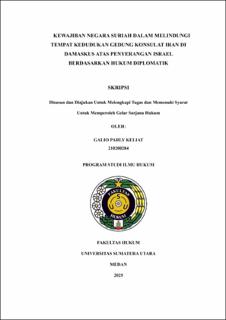| dc.contributor.advisor | Sutiarnoto | |
| dc.contributor.advisor | Rizky, Fajar Khaify | |
| dc.contributor.author | Keliat, Galio Parly | |
| dc.date.accessioned | 2025-07-18T04:13:52Z | |
| dc.date.available | 2025-07-18T04:13:52Z | |
| dc.date.issued | 2025 | |
| dc.identifier.uri | https://repositori.usu.ac.id/handle/123456789/105749 | |
| dc.description.abstract | The attack on the premises of the Iranian Consulate in Damascus by Israel raises serious concerns regarding Syria’s responsibilities as the receiving state in ensuring the protection of foreign diplomatic missions. The protection of diplomatic and consular missions constitutes a fundamental obligation that must be upheld by the receiving state in accordance with international law, particularly the 1961 Vienna Convention on Diplomatic Relations and the 1963 Vienna Convention on Consular Relations. This study aims to analyze Syria’s obligations as the receiving state to protect the premises of the Iranian Consulate in Damascus in light of the attack conducted by the State of Israel. The research addresses the following problem formulations: What are the rights to immunity and privileges granted to diplomatic missions by the receiving state? How is the receiving state’s responsibility to protect diplomatic premises viewed under diplomatic law? How is Syria’s obligation as the receiving state assessed in protecting the premises of the Iranian Consulate in Damascus against the Israeli attack under diplomatic law? This research adopts a normative legal method with a descriptive approach. The data consist of primary, secondary, and tertiary legal sources. Data collection was carried out through library research and analyzed using qualitative normative analysis.
The findings indicate that Syria, as the receiving state, violated its obligations to protect the premises of the Iranian Consulate in Damascus as regulated under Article 22(2) of the Vienna Convention on Diplomatic Relations 1961 and Article 31(3) of the Vienna Convention on Consular Relations 1963. Syria’s failure to protect the consular premises also constitutes a violation of Article 40 of the 1963 Vienna Convention on Consular Relations, which requires the receiving state to safeguard consular officers from any form of attack on their person, freedom, or dignity. As the receiving state, Syria was under a legal obligation to protect both the premises of the Iranian Consulate and the consular officials in Damascus from acts of violence, destruction, or any actions that may undermine their dignity, in accordance with Article 31(3) and Article 40 of the Vienna Convention on Consular Relations 1963. | en_US |
| dc.language.iso | id | en_US |
| dc.publisher | Universitas Sumatera Utara | en_US |
| dc.subject | Obligation | en_US |
| dc.subject | State | en_US |
| dc.subject | Protection | en_US |
| dc.subject | Diplomatic Representative | en_US |
| dc.subject | Consular Premises | en_US |
| dc.title | Kewajiban Negara Suriah dalam melindungi Tempat Kedudukan Gedung Konsulat Iran di Damaskus atas Penyerangan Israel berdasarkan Hukum Diplomatik | en_US |
| dc.title.alternative | The Obligation of the Syrian State to Protect the Iranian Consular Premises in Damascus from the Israeli Attack Based on Diplomatic Law | en_US |
| dc.type | Thesis | en_US |
| dc.identifier.nim | NIM210200284 | |
| dc.identifier.nidn | NIDN0010105626 | |
| dc.identifier.nidn | NIDN0020078906 | |
| dc.identifier.kodeprodi | KODEPRODI74201#Ilmu Hukum | |
| dc.description.pages | 160 Pages | en_US |
| dc.description.type | Skripsi Sarjana | en_US |
| dc.subject.sdgs | SDGs 16. Peace, Justice And Strong Institutions | en_US |


